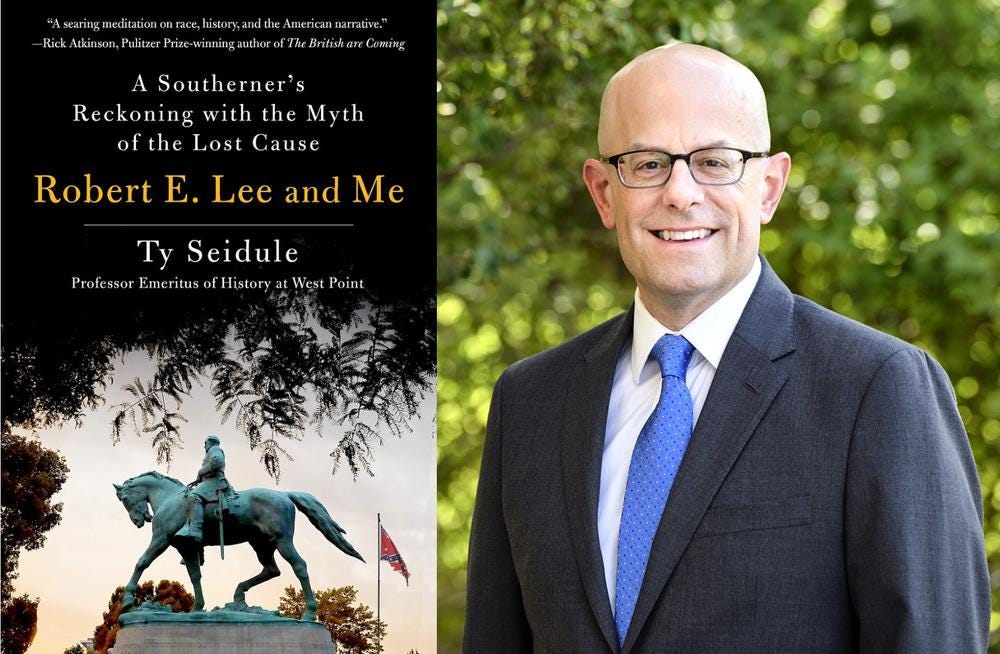Next week I will interview Professor Ty Seidule about the work that he recently completed as co-chair of The Naming Commission. The commission was created to review military assets that honor Confederate leaders and recommend necessary changes for the U.S. military to implement. The three reports published recommend a wide range of changes, including new names for military bases that honor Confederate leaders and the removal of the Confederate memorial in Arlington National Cemetery.
Though this interview will only be available to paid subscribers, I wanted to give all of you the opportunity to suggest questions that I should ask Dr. Seidule. [The comments section below is open to everyone.]
Dr. Seidule is a retired army officer, who taught for a time at West Point before moving on to Hamilton College. His book, Robert E. Lee and Me, published in 2020, explores the author’s journey growing up revering the Lost Cause and all things Confederate and the challenge of finally coming to terms with it.
The book has sold tens of thousands of copies.
I first learned about Dr. Seidule back in 2015 with the release of a short video on the cause of the Civil War. That year witnessed the closing events of the Civil War sesquicentennial and the Charleston murders.
In the video, Professor Seidule clearly explains how slavery led to secession and war in 1861. Nothing in the video was particularly controversial, but it quickly went viral, generating millions of views and heated debate. Interestingly, the video was produced by and posted to Prager University’s YouTube page. Prager is known for their 5-minute videos that offer a conservative perspective on a wide range of subjects.
Here was a man in military uniform not only laying out what every reputable historian recognizes as a fairly straightforward history, but at the end offered the following: “As a soldier I am proud that the United States army, my army, defeated the Confederates. In its finest hour, soldiers, wearing this blue uniform, almost two hundred thousand of them, former slaves themselves, destroyed chattel slavery, freed 4 million men, women, and children from human bondage and saved the United States of America.”
This promises to be a fascinating discussion.





Sent to me via private email: "After reading Robert E. Lee and Me, I often think about how Seidule described a bust of Lee on a church altar, and how that seemed so natural to him in his younger years. Every time I see an image of Donald Trump that's either portraying him as devoutly being with Jesus--or, in some cases, being the resurrected Jesus--I think about how people with white supremacy views often conflate these two men with the divine. I don't have a specific question, but would love to hear more thoughts about that. Thanks!"
Hi Kevin,
So glad to see you are speaking with Prof Seidule.
His book was a revelation for me, an overused term I know but I don't know how else to describe the sense of shared experience with him. This even though I grew up at about the same time and in about the same place but very much on the *other side* of the Mason-Dixon line in south Central PA about 30 miles from Gettysburg. Despite the ravages that my state endured at the hands of not just the Confederate Army but also decades of mercenary 'slave catchers' (most famously during the 'Christiana Riot' in 1851) I was fed the same books, information and teaching that portrayed Lee et al as noble - if briefly misguided - warriors for a cause. His examination of how and why we were educated this way had deep personal resonance.
My question for the Prof (you knew I would get there eventually): How has he / has he seen the attitudes of his current and former colleagues in the Military change and evolve over the years similar to his? has there been an awakening similar to the one he has experienced or is his perspective an outlier? I'm not so much interested in public pronouncements of the institutions but in any personal reflections that may have been shared with him. And most importantly what was the inflection or tipping point - the ‘aha I get it’ moment - that helped any of these folks understand that the Confederates were not to be revered but reviled?
Probably three questions for the Professor but thanks again for doing this important work.
- Charles Stewart